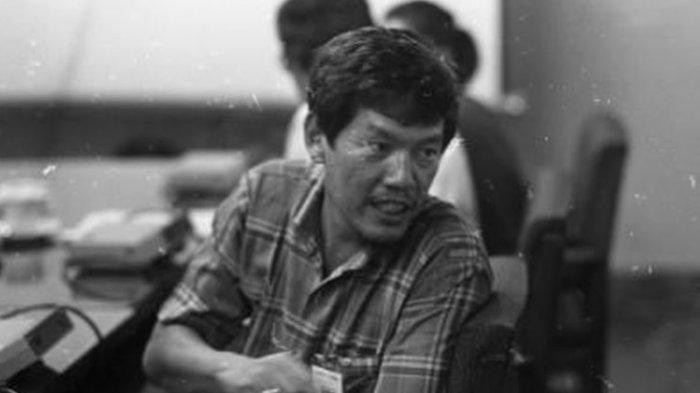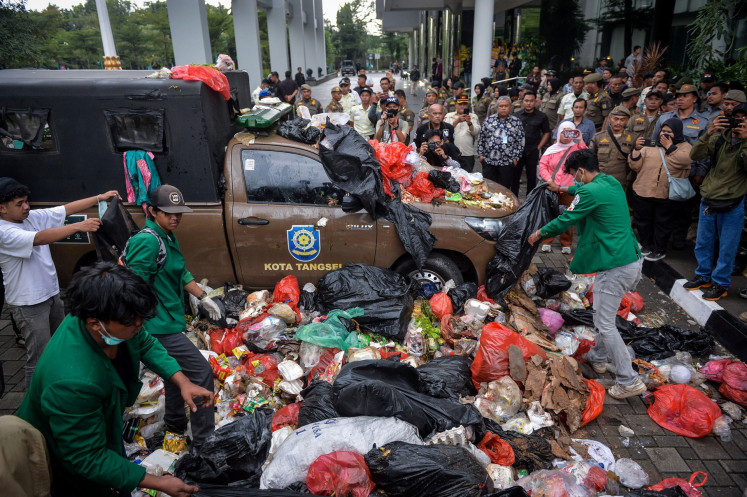Popular Reads
Top Results
Can't find what you're looking for?
View all search resultsPopular Reads
Top Results
Can't find what you're looking for?
View all search resultsQuestioning Arief Budiman’s religion
Arief, if seen from the perspective of sharia, might not be deemed as a true religious follower. It could even be said that he is not so concerned with religion. But clearly, he was not an atheist who denied the existence of God.
Change text size
Gift Premium Articles
to Anyone
I
do not personally know Arief Budiman. But I have read a lot of the books he wrote, especially the two small books that became my favorite references when I was a post-graduate student for Political Science at the University of Indonesia.
The two small books are Teori Pembangunan Dunia Ketiga (Third World Development Theory) and Teori Negara: Negara, Kekuasaan dan Ideologi (State Theory: State, Nationality and Ideology). Both were published by Gramedia.
When I heard Arief had passed away, I opened the two books again. My son, Ghazali Hasan Nasakti, who in the second semester of the School of Law at the National Development University (UPN) of Jakarta, suddenly appeared.
“This is the author who just passed away, huh?" asked Sakti, my son's nickname.
I just answered, yes!
Sakti asked again: "Arief Budiman was a Christian, right?"
"No, son. He was a Muslim.”
"He was Soe Hok-Gie's elder brother, right?"
"Yes, but he was different from his brother, he was Muslim."
"How come?"
"Maybe because he married a Muslim woman, Leila Chairani." I answered blindly.
Indeed, talking about Arief’s religion is interesting for two reasons. First, Indonesian people are unique because they are generally always curious about other people's religions, even though religion is a private matter. But anyone who considers religion a private matter will usually be sneered at as a liberal or influenced by Western culture that does not care about religion. Again, this is unique, because the word "west" is not in accordance with facts. Don't you see, Muslims pray facing west, right?
For Indonesians, religion is not a private matter. For this reason, the proposal to remove the religion column on ID cards will always face strong opposition. The reason is that the community is keen to know other people’s religions so that when they die, their burial is arranged according to their religion.
Second, many people are often mistaken, thinking Arief is a non-Muslim because his birth name is Soe Hok Djin, a Chinese name, has nothing to do with Muslims. In fact in this country, there are already many Chinese Muslims, including Felix Siauw, who is known as a cleric, and Nio Cwan Chung, who is better known as Muhammad Syafii Antonio.
Read also: Arief Budiman, dissident academic under New Order, dies at 79
Why is Arief’s Islamism less apparent? Because we often dichotomize Islam into political problems and humanity. The values of democracy and how to fight for the rights of the oppressed written by Arief are not considered part of Islamic teachings.
The core of Islamic teachings is tauhid (monotheism) and tauhid can only be true when translated into the fight for humanity. Prophet Muhammad said no one is a true believer when satisfied and his neighbor is starving. It is a fact that faith and humanity are a unity that cannot be resolved.
Upholding social democracy, which was the focus of Arief, is part of Islamic teachings. Social inequality, according to Islamic teachings, must be eliminated, which is why wealthy people are obliged to pay zakat (alms). The easier it is for someone to get wealth, the higher the percentage of zakat that must be paid. Fighting social inequality, as suggested by former Muhammadiyah chairman Amien Rais, is the core of social monotheism.
In 1970, Arief strongly opposed first lady Tien Soeharto’s monumental project of Taman Mini Indonesia (TMII). Because of his movement, Arief was arrested and locked up for one month by the Command for Restoration of Security and Order (Kobkamtib), a New Order institution directly under former president Soeharto.
Arief was a well-known promoter of abstention, known as golput, or a movement to choose the white space of a ballot paper instead of the pictures of political parties contesting the 1971 election. Golput was a crushing movement against tyranny. In Islam, fighting tyranny is considered jihad.
Arief, if seen from the perspective of sharia, might not be deemed as a true religious follower. It could even be said that he is not so concerned with religion. But clearly, he was not an atheist who denied the existence of God.
One of his close friends, M. Syafii Anwar, said months before his death that with poor health, Arief became very religious. During Idul Fitri, Syafii, along with his wife and children, paid a visit to Arief in Salatiga, Central Java. When the prayer time arrived, Arief joined the congregational prayer.
Leila said, according to Syafii, that her husband had passed away peacefully. Leila is a picture of a shalihah (fully religious) wife and faithfully accompanied her husband until the end of his life.
God willing, her prayers were answered. On Thursday, one day before Ramadan, the month full of grace and forgiveness, Arief departed. Goodbye and rest in peace, brother!
***
Executive director of Maarif Institute, Jakarta










